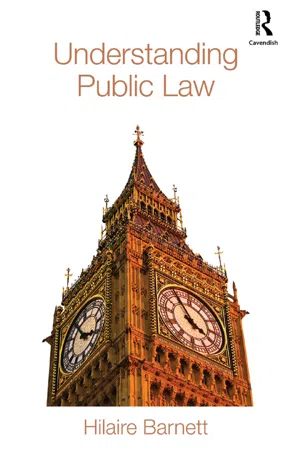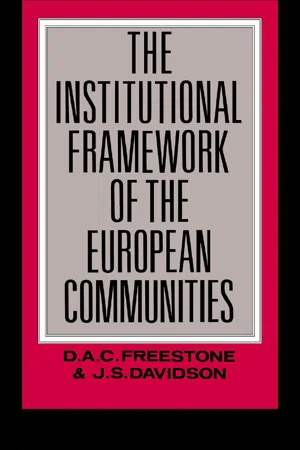Politics & International Relations
European Communities Act 1972
The European Communities Act 1972 was a key piece of legislation in the United Kingdom that provided for the incorporation of European Community law into domestic law. It effectively allowed for the supremacy of EU law over UK law, and played a crucial role in the UK's relationship with the European Union until its eventual repeal in 2020 following Brexit.
Written by Perlego with AI-assistance
Related key terms
5 Key excerpts on "European Communities Act 1972"
- eBook - ePub
- Hilaire Barnett(Author)
- 2009(Publication Date)
- Routledge-Cavendish(Publisher)
The means by which international law – of which EC law is an example – enters into the domestic legal system of Member States depends on the approach of that State to international law. There are many countries – the majority of European states – that take the view that once a Treaty is signed and ratified, its laws automatically enter into domestic law, without the need for any action on the part of the domestic legislature. This approach is known as monism: the idea being that international law and domestic law are conceptually part of the same order, with international law taking priority. A dualist state, by contrast, takes the view that international law and domestic law are conceptually separate and distinct entities, and that international law cannot enter into the domestic legal system unless and until the domestic Parliament enacts a law that makes provision for its entry. The UK is a dualist state.Figure 6.5The European Communities Act 1972
The European Communities Act 1972 enables Community law to take effect within the domestic legal system. Section 2 is the most important section. Section 2(1) provides, in part, that:All such rights, powers, liabilities, obligations and restrictions from time to time created or arising by or under the Treaties, and all such remedies and procedures from time to time provided for by or under the Treaties, as in accordance with the Treaties are without further enactment to be given legal effect or used in the United Kingdom shall be recognised and available in law, and be enforced, allowed and followed accordingly; and the expression ‘enforceable Community right’ and similar expressions shall be read as referring to one to which this subsection applies.Section 2(2) of the Act provides that delegated legislation may be used to implement EU law, while section 2(4) directs the courts to interpret domestic law in line with EU law. As a result of these provisions, when the judges in the UK give effect to EU law they do so as a result of an ordinary Act of the UK Parliament: the European Communities Act 1972. The courts, however, have adopted a more purposive approach than usual to Community law – that is to say, the court looks less at the exact wording of the statute and more towards the objective being sought by that statute. - eBook - ePub
- Richard Glancey(Author)
- 2014(Publication Date)
- Routledge(Publisher)
Community treaties and Community law capable of having direct effect in the UK were given such effect by the European Communities Act 1972, which, by s 2(1), incorporated all existing Community law into UK law. No express declaration of the supremacy of Community law is contained in the Act; the words intended to achieve this are contained in s 2(4) of the 1972 Act, which reads as follows: ‘… any enactment passed or to be passed … shall be construed and have effect subject to the foregoing provisions of this section.’ The words ‘subject to’ appear to suggest that the courts must allow Community law to prevail over a subsequent Act of Parliament. ‘[T]he foregoing’ are those provisions referred to in s 2(1) giving the force of law to ‘the enforceable Community rights’ there defined. 8 The problem arises in respect of statutes passed after 1 January 1972. According to the traditional doctrine of parliamentary sovereignty, the later Act should prevail as representing the latest expression of Parliament’s will, but the Community doctrine of the primacy of EU law and s 2(4) would require Community law to prevail. In this respect, it has become clear from the Treaty as interpreted by the ECJ (see Costa v EN EL (1964) and Amministrazione delle Finanze dello Stato v Simmenthal SpA (1978)) that it is an implied Community principle that Community law should prevail over national law. In Secretary of State for Transport ex p Factortame Ltd and Ors (1990), the UK courts had to consider the question of direct conflict between domestic and European Community law - eBook - ePub
Beyond Brexit
Towards a British Constitution
- Vernon Bogdanor(Author)
- 2019(Publication Date)
- I.B.Tauris(Publisher)
39 It may be that some politicians came to accept that British membership of the Communities entailed the undermining of parliamentary sovereignty, but it is doubtful if the people ever did, although it is, of course, perfectly possible that they might have done so over a longer period of time. But in the forty-five years that Britain remained a member of the European Community/European Union, it is doubtful if the idea of the primacy of European law ever gained widespread popular acceptance. That, no doubt, is a further reason why British membership of the European Union never developed deep roots amongst the British public and it was perhaps a pointer to the outcome of the Brexit referendum.But, as we have seen, if the sovereignty of parliament can be abridged in one direction, it can also be abridged in another. The European Communities Act and Britain’s membership of the European Communities and the European Union created a precedent, fundamentally altering the British constitution.The European Communities Act transformed the character of the British constitution, the constitution which Dicey had called ‘historical’. For the Act had the quality of fundamental law and perhaps it began what may prove a long and tortuous process along the road towards a codified constitution. Later, towards the end of the twentieth century, the devolution legislation of 1998 and the Human Rights Act of 1998 further exemplified that process and may prove to be further steps along that road. By the end of the twentieth century, it was apparent that the British constitution was being refashioned in a highly conscious and deliberate way. It would be difficult to conceive of a more profound change in our constitutional arrangements. And this process began with the European Communities Act. Without that Act, without British entry into the European Community, it is possible that the process might not even have begun and perhaps the sovereignty of Parliament would not have been abridged. There can be no doubt, therefore, that membership of the European Community fundamentally altered the British constitution. Indeed, by means of the European Communities Act, Britain took a quantum leap from Dicey’s ‘historical’ constitution to a legal constitution. The question now to be asked is whether Brexit will also fundamentally alter the constitution, either by returning us to the status quo ante, or by leaving embedded in the constitution changes which were a result of our membership of the European Community and European Union. I will seek to answer that question in Chapter 5 in which I analyse whether membership of the European Community and the European Union have fundamentally altered our conception of human rights; and in the concluding chapter, Chapter 7 in which I discuss whether Brexit is likely to prove the catalyst for a codified constitution. Whatever the future holds, as a result of Britain’s European involvement, the sovereignty of Parliament has been irretrievably damaged. - eBook - ePub
- Murray Hunt(Author)
- 1997(Publication Date)
- Hart Publishing(Publisher)
Some of the Government’s ministers were clearly prepared to countenance at the very least a version of self-embracing sovereignty as the minimum constitutional modification necessary so long as the UK remained a member of the Community. However, it would be impossible to say that this was in any meaningful sense the “intention” of the 1972 Parliament when enacting the relevant provisions of the ECA, as the most cursory glance at the parliamentary debates reveals. As Wade has observed, commenting on the parliamentary reaction to subsequent Community law developments, “in 1972 the root problem of sovereignty was never quite cleanly disposed of.” 147 Members of Parliament who were concerned that the Act foreshadowed the end of Parliament’s sovereignty were bought off with ministerial assurances that Parliament remained sovereign, that it was theoretically incapable of binding its successors; in short, that the doctrine of continuing sovereignty was alive and well. Despite the innovative form of the legislation, the judicial response was, at least during the early years following accession, as constitutionally unimaginative as the White Paper. The sovereignty-derived concept of incorporation was preferred as the explanation for how directly effective Community law had come to have the force of law in the UK, by virtue of s. 2 of the ECA 1972 and, as de Smith had correctly predicted, judicial recognition of Parliament having subordinated itself to a superior law-maker was not at all readily forthcoming. 148 From the late 1970s, however, a growing number of individual judges were prepared to abandon the theory of continuing sovereignty and hold that inadvertently inconsistent domestic law had to give way to Community law, relying on s. 2(4) ECA as mandating such a consequence - J. S. Davidson, D. A. C. Freeston(Authors)
- 2005(Publication Date)
- Routledge(Publisher)
alia, research and technological development and the environment. This means that rather less reliance will need to be placed on either straining the meaning of Articles 100 and 235 or hoping for developments within the context of political cooperation.Paradoxically, the existence of the residual legislative powers of Article 235—and the possibility of amendment of the Treaty itself under Article 236—have possibly inhibited the development in Community law of the doctrine of implied powers. In international institutional law and the law of federal constitutions the doctrine of implied powers—whereby powers deemed necessary to achieve the objectives of the constitutional document but not specifically conferred are deemed to have been given—has been an important dynamic, often ensuring that the purpose of a constitutional provision is not frustrated by technicalities. Despite the generally expansive interpretation of the Treaty by the ECJ it is only in one field—that of external relations—that the doctrine of implied powers per se has been employed extensively. Relatively early in its case law the ECJ ruled that the initiation of a common Community legislative programme in a specific area, e.g. regulation of transport or fisheries, carried with it an implied exclusive common external competence.38THE EUROPEAN PARLIAMENT
Since 1962 the Assembly, as it is called in the EEC Treaty,39 has called itself the European Parliament (EP). This term, which is now given official recognition by the Single European Act, will be used in this book, although it is important to realise at the outset that the EP is not a parliament in the sense that Westminster is a parliament. It does not pass legislation, nor is the executive chosen from its members. As we have seen, the legislative and executive functions are performed by the Council and the Commission. The Treaty only gives it restricted ‘advisory and supervisory powers’. The French text uses the expressions ‘pouvoirs de deliberation’ and ‘pouvoirs de contrôle’, this term ‘contrôle’
Learn about this page
Index pages curate the most relevant extracts from our library of academic textbooks. They’ve been created using an in-house natural language model (NLM), each adding context and meaning to key research topics.




